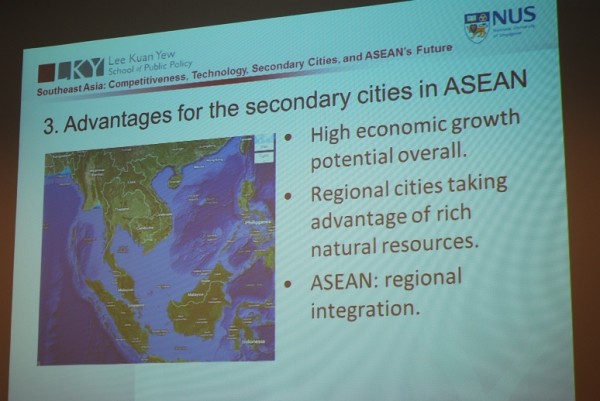The Global Food Studies staff, Dr Xiaobo He, recently attended a two-day explanatory workshop ‘Southeast Asia: Competitiveness, Technology, Secondary Cities, and ASEAN’s Future’ on 20-21 September 2013 hosted by Lee Kuan Yew (LKY) School of Public Policy at the National University of Singapore. The purpose of the workshop was to identify and explore the opportunities for research about information and communication technology (ICT) and secondary ASEAN cities.
More than 30 researchers from Singapore, Australia, Indonesia, the Philippines, Thailand, the UK and Vietnam attended the workshop. The workshop and potential three-year research activities are funded by the Microsoft.
Each researcher provided a 15-minute presentation on their own research interest in relation to the broad theme, i.e. the role of ICT in the development of ASEAN secondary cities. Sub-topics consisted of ‘ICT and governance’, ‘ICT and economic development’, and ‘ICT and sociocultural changes’.
Dr He presented a brief research plan which relates to the second sub-topic on ‘ICT and economic development’, addressing the link between ICT and entrepreneurship in secondary cities.
He reviewed the existing literature and pointed out that, little attention has been paid to secondary cities in this research area. In addition, he proposed an empirical model in a panel data framework and planned to use industry-city specific indicators to provide more accurate measures of entrepreneurship and the adoption of ICT. Methodologically, he suggested a fixed-effect model with instrumental variables to mitigate the issues of endogeneity.
Other researchers shared their research experience in diverse areas, for example, the usage of ICT in their home countries (e.g. Thailand and Vietnam), the usage of ICT in particular industries (e.g. airports), an on-going project using ICT to collect individual demographic and economic information in a small ASEAN city, and the urban planning (e.g. transportation) in some secondary cities, etc.
The workshop provided a good platform where researchers from different disciplines could contribute their knowledge and expertise to this promising project. Many attendees arrived at consensus that:
the success of the project might not only lead to a better understanding of development modules of secondary cities, but also result in ‘a big push’ of ICT in less developed cities which would eventually raise the efficiency of city governance, encourage local entrepreneurship, improve the well-being of inhabitants, and stimulate economic growth.
Moreover, the pending cross-country cooperation per se will be largely benefited from an ICT product, for example the Microsoft Skydrive.
Finally, the outcome of this workshop will be a completed research proposal which is expected to be submitted by December 2013.


